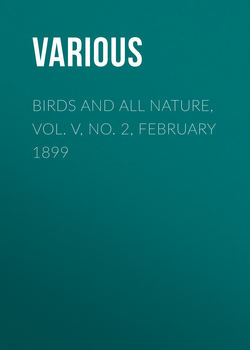Читать книгу Birds and all Nature, Vol. V, No. 2, February 1899 - Various - Страница 5
WASHINGTON AND LINCOLN
ОглавлениеEMILY C. THOMPSON
IT is natural that at this time our thoughts should turn toward two of our great national heroes. This month is to us not merely the month of February, marking one of the twelve divisions of our calendar year, but it is a continuous memorial of two of our revered statesmen. We read all we can about our glorified dead, we search the words spoken by them, we visit the places where they toiled for us, and we scan even their homes trying to form a picture of their lives. We do even more. We presume to imagine their thoughts and conjure up the very ideas which might have occurred to them as they stood in these spots now hallowed by memories of them.
It is a fascinating occupation to fathom the characters of truly great men and contemplate their attitude toward various subjects. Sometimes mere conjectures are the fruit of our toil. At other times sure conclusions are reached from facts which are brought to light. Stories galore are told of both Lincoln and Washington, which help us more vividly to picture their natures. The question in which we are interested could easily be answered if we knew these men, but still as we are acquainted with the manifestations of their characteristics we can answer it almost as satisfactorily. Did Lincoln and Washington love nature? Could they appreciate her beauties, and did they evince an interest in her creations?
Lincoln in his log-cabin home, splitting rails, working on the farm, hunting coons, driving the horses and cattle, must have found a glorious opportunity to become acquainted with this great mother of ours. The son of a pioneer who, with his great covered wagon, cattle, family, and household belongings, wanders over the country, whose only neighbors for hundreds of miles are the birds in the woods, the rabbits in the field, and the fish in the stream, the son of such a man certainly sees nature as few of our city-bred, World's Fair, Paris Exposition young people, can imagine it. Lincoln was content with these, his neighbors. Never do we hear sighs from him and wishes that his lot might be exchanged for that of another, even if his lot was toilsome and lonely. Who can tell but he thus imbibed his love for pure freedom undefiled and his lofty conceptions of this life in its relation to this world and something beyond?
We cannot doubt that the great, tall, clumsy lad had a real love in his heart for the little feathered and furry friends about him, and not simply a love for the beautiful ones, but what is far higher a feeling of sympathy even for the ugly and a genuine tender solicitude for all.
Even when the youth became a man perplexed by business and political problems his nature remained unaltered. Once when a party of his friends on a judicial circuit stopped to water their horses, Lincoln was not there. His companion on the way was asked of his whereabouts. He replied that the last he had seen of Lincoln he was hunting around for a bird's nest, two of the former occupants of which he held in his hand. The wind had blown the tiny nestlings from their snug little home and the greathearted man was trying to find the nest for the wee, helpless chirpers. The same great heart which felt the human cry of pain as keenly as the bewildered cry of the little birds gave its last throb to restore little black nestlings to the warm comfort of free homes protected by law.
